

Declining your ballot? Not in federal elections. The federal government has no plans to change its elections law so that voters can register a declined vote, even though that form of protest hit record levels in Ontario’s recent election.
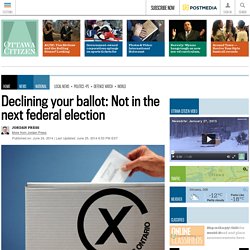
The Conservative government made sweeping changes to the federal election law this year through the Fair Elections Act, including detailed rules around voter identification at polling stations. However, the office of Democratic Reform Minister Pierre Poilievre said this week that the government “has no plans to amend the Canada Elections Act to track declined ballots.” More than 31,000 Ontarians declined their ballot in the June 12 election, the highest number to do so since 1975 and a dramatic increase over levels in the last election. NOBODY Wins Big!!! Real clear election results(image by Michael Collins) In the perpetual democracy pageant that takes place in Washington, DC, the representatives, including the president, are all minority representatives.

The people have spoken. Their preference is clear. By an overwhelming majority, the favorite candidate of the American public is NOBODY. But, wait, that makes no sense. Like unemployment, banking, and other critical data coming from the government(s), turnout isn't really turnout. Here are the real turnout numbers: Only 36.6% of eligible voters (real turnout) bothered to vote.Six states had real turnout between 50% and 60%Eighteen states had turnout between 40% and 49%Twenty one states were between 30% and 39%Six states had turnout below 30% Michael McDonald, U.S. Let's look at the turnout winners and losers, the highest and lowest in real turn out. Real Turnout - Top and Bottom of the Barrell(image by Michael Collins) What is the real motive behind individual voter registration?
Picture this.
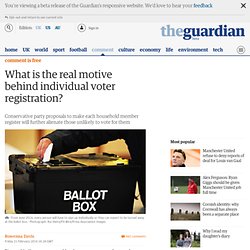
You are 19 years old and you manage to get down to the polling station on election day. Maybe you finally make up your mind about who to vote for as you walk in the door. But before you get that far, you're stopped. "Sorry Miss, you're not on the electoral register. I'm afraid you won't be able to vote today. " This kind of humiliation is already felt by many in this country. This crisis is about to get even worse under the government's new proposals for individual voter registration. Labour candidates have been shouting from the rooftops about this problem for some time. It's one of a number of measures proposed by Labour.
The government says that individual voter registration is needed to prevent fraud, and I expect it would reject Labour's proposed solutions on the same grounds. Election reform will deter some voters, lawyer warns - Politics. A participant in the bruising American battle over voting rights warns that Canada is treading on dangerous ground with its proposed electoral reforms.
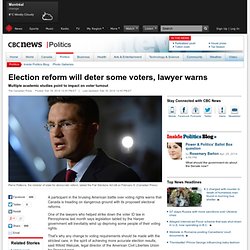
One of the lawyers who helped strike down the voter ID law in Pennsylvania last month says legislation tabled by the Harper government will inevitably wind up depriving some people of their voting rights. That's why any change to voting requirements should be made with the strictest care, in the spirit of achieving more accurate election results, said Witold Walczak, legal director of the American Civil Liberties Union for Pennsylvania. That warning comes from a country where voting rights are an especially emotional subject, for obvious historical reasons. Americans know the issue well. And the impact of ID rules has been studied extensively, re-emerging in recent years as a hotly debated partisan issue. The Canadian bill, on the other hand, would still allow 39 types of ID.
Historical overtones Such changes are sure to deter some voters. Voter turnout. Voters lining up outside a Baghdad polling station during the 2005 Iraqi election.
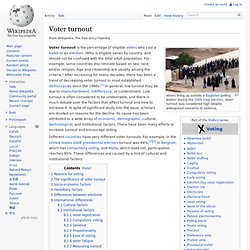
Voter turnout was considered high despite widespread concerns of violence. Voter turnout is the percentage of eligible voters who cast a ballot in an election. (Who is eligible varies by country, and should not be confused with the total adult population. For example, some countries discriminate based on sex, race, and/or religion. Age and citizenship are usually among the criteria.) Different countries have very different voter turnouts. Reasons for voting[edit] The basic formula for determining whether someone will vote, on the questionable assumption that people act completely rationally, is[7] where Since P is virtually zero in most elections, PB is also near zero, and D is thus the most important element in motivating people to vote.
Voter Turnout in Canada. Since the 1980s, voter turnout in federal elections has fallen sharply.
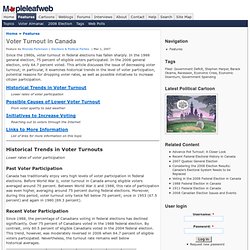
In the 1988 general election, 75 percent of eligible voters participated. In the 2006 general election, only 64.7 percent voted. This article discusses the issue of decreasing voter turnout; in particular, it examines historical trends in the level of voter participation, potential reasons for dropping voter rates, as well as possible initiatives to increase citizen participation. Historical Trends in Voter Turnout Lower rates of voter participation Possible Causes of Lower Voter Turnout From voter apathy to bad weather Initiatives to Increase Voting Reaching out to voters through the Internet Links to More Information List of links for more information on this topic.
Voter Turnout.